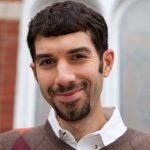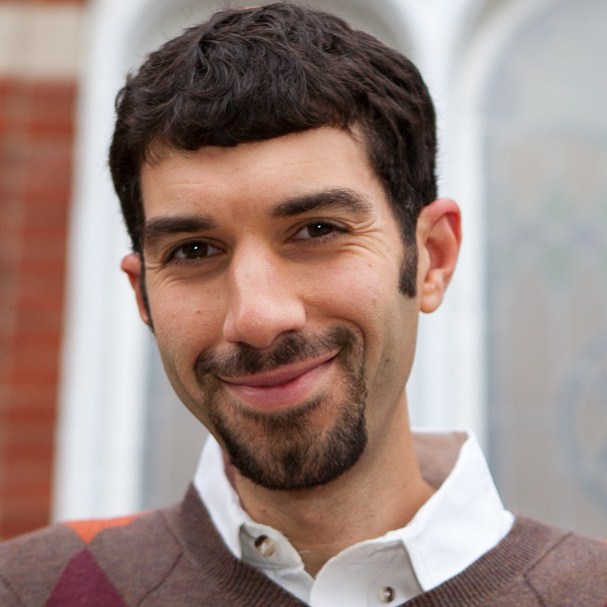Rabbi Aaron Levy

Makom offers thoughtful text-based learning for teens and adults that explores the diverse, rich intellectual material of our tradition not only to seek knowledge (da`at), answering the questions of “What?” and “How?”, but also for wisdom (chochma) – “Why?” Our learning is open to questioning and encourages nuanced thought. Jewish sources are situated in both their broader historical contexts (e.g., how their ideas relate to those of other cultures contemporaneous to the Jewish text) and in the contemporary, multicultural milieu that is downtown Toronto.
Initially, I envisioned social and environmental activism as a pillar of Makom’s programming. I’ve come to realize that over the past nine years, I’ve put less work into creating specific programs in this area than in others, although Makom does offer some programs that explicitly address these issues (e.g., recent programs around incarceration in Ontario and African asylum seekers in Israel). However, perhaps more significantly, progressive social, economic, animal welfare and environmental values inform and underpin our community’s ethos and day-to-day decisions. This is manifest in Pay What You Can membership and program fees, composting or recycling nearly all waste, furnishing our multipurpose storefront office and program space with donated and found furniture and serving only vegan food at all our events. We enthusiastically welcome people across religious backgrounds, ages, economic classes, sexual orientations and gender identities.
Bringing diverse Jews and non-Jews together to form a warm and supportive community in which to explore Judaism is very much an objective of Makom, yet I have found this the most difficult goal to achieve. Particularly, many individuals who participate in any given program, class, or service won’t likely come to another Makom event until some months later. This despite the glowing feedback we often receive from newcomers and returning participants alike.
I don’t think this is a shortcoming in the quality of the experience people have with Makom. This phenomenon seems to be a consequence of: a) the infrequent involvement many downtown Jews want with any organized Jewish life (even with a grassroots, non-establishment community such as Makom); and b) the lack of commitment many downtown Jews want to make to any given community. The latter extends not only to not becoming formal members of Makom or any other community in which such downtown Jews might participate regularly, but also to the tendency, especially of Millennial Jews downtown, to be peripherally involved in multiple Jewish communities without committing or materially contributing to any of them.
Forging cohesive community remains an important goal for Makom, elusive as it seems to be. Cohesive community was the primary impetus for initiating monthly, vegan Shabbat dinners throughout 5778. Long, unhurried meals celebrating sacred time seemed a natural means to facilitate friendships and interpersonal connections. The five communal Shabbat dinners thus far have begun contributing to a sense of community in Makom, but there’s still much work to be done, both through such programs and through educating about the Jewish and general life values of commitment, regularity and covenantal relationships with each other and our Judaism.
I disagree with Rabbi Sid’s assertion that “liberal/progressive Jews skew strongly toward covenantal attitudes and behaviors.” In my experience, many liberal Jews hold liberal (or universalist) values and ethics, but those aren’t covenantal values, per se, for they don’t consider themselves part of a covenant – a mutually binding commitment that places responsibilities on its parties.
Conversely, I see most traditionally observant (usually Orthodox) Jews very much as “covenantal Jews,” who are tribal Jews only secondarily. Brit (covenant) and mitzvah (commandment) are the real-world meta-principles of traditionally observant Jewish life.
The preponderance of “tribal Jews” I observe identify proudly as Jews, value having Jewish social circles, and feel a strong affiliation with the State of Israel. But their Jewish identity doesn’t tend to lead to particular values or behaviours, and certainly not the halakhic commitments of traditionally observant Jewish communities.
Makom’s main strategy of attracting and inspiring downtown Jews is through unabashed Jewish spirituality. We hold joyous, even ecstatic, totally participatory bi-weekly Friday-night services, at which there are no performers and no spectators – we’re all joining our voices together. We sometimes invite participants to bring instruments, but it’s not a band playing at the front of the room; instead instruments are interspersed amongst the tzibbur – the prayer community. These same qualities feature in our services for the Days of Awe, other holidays, and occasional Shabbat mornings. Makom also offers regular meditation sits and chanting circles. These experiences can facilitate a sense of kedusha (holiness), regardless of one’s underlying beliefs. Even those who self-identify as secular Jews and may not believe in God often report feeling a sense of transcendence participating in Makom’s services. One such community member calls communal tefillah (prayer) her “spiritual karaoke.”
One aspect of Makom’s mission that falls outside the Rabbi Sid’s four propositions is Jewish art and culture. We host an artist-run exhibition space presenting rotating, site-specific installations of contemporary art connected to the Jewish experience in our storefront window, visible to the general public of passersby. Inside our space, our walls present photographic exhibitions exploring Jewish life from Morocco to our immediate, historic Jewish neighbourhood. Makom offers concerts and art-making workshops for adults, tied to holidays. While not, to my mind, as central to Judaism as learning, ethics, community, and spirituality, Jewish culture is an important and necessary by-product of Jewish living and when, like other aspects of Judaism, it is presented in a thoughtful, high-quality fashion, it resonates with many diverse Jews.
_____________________________
Rabbi Aaron Levy is a leader in the revival of downtown Jewish life in Toronto, where he is the founding director of Makom: Creative Downtown Judaism, a diverse grassroots community fusing Jewish tradition and progressive values through spirituality, learning, and culture since 2009. Ordained in 2004 in the first graduating class of Yeshivat Chovevei Torah, he is also an avid drummer, cyclist, hiker, and vegan.


